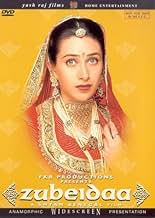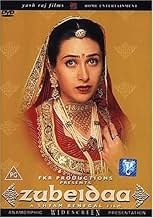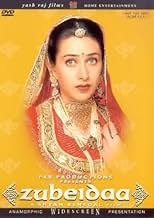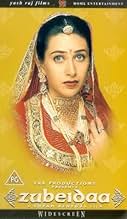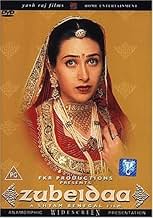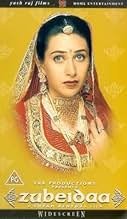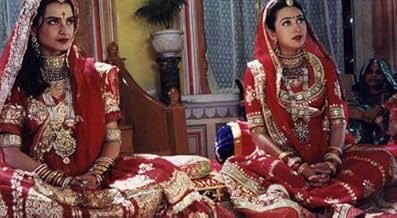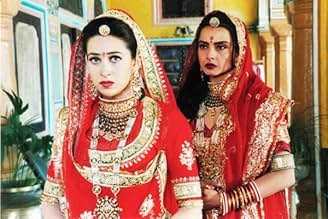CALIFICACIÓN DE IMDb
6.6/10
1.7 k
TU CALIFICACIÓN
Agrega una trama en tu idiomaZubeidaa, an aspiring Muslim actress, marries a Sikh prince to become his second wife. Her tumultuous relationship with her husband, and her inner demons lead her to a decision which has fat... Leer todoZubeidaa, an aspiring Muslim actress, marries a Sikh prince to become his second wife. Her tumultuous relationship with her husband, and her inner demons lead her to a decision which has fatal consequences for them all.Zubeidaa, an aspiring Muslim actress, marries a Sikh prince to become his second wife. Her tumultuous relationship with her husband, and her inner demons lead her to a decision which has fatal consequences for them all.
- Premios
- 3 premios ganados y 15 nominaciones en total
Manoj Bajpayee
- Raja Vijendra Singh
- (as Manoj Bajpai)
Rajit Kapoor
- Riyaz Masud
- (as Rajit Kapur)
- Dirección
- Guionistas
- Todo el elenco y el equipo
- Producción, taquilla y más en IMDbPro
Argumento
¿Sabías que…?
- TriviaThe jewelry worn by Karisma Kapoor and Rekha in the film actually belonged to the Jaipur royal family. Both actresses were told to be very careful when wearing it.
- ErroresThe events of the movie are happening in the 1950s, around the time of decolonization, yet the prince Victor appears to be flying a 1982 model of Cessna 172.
- ConexionesFeatured in Bollywood/Hollywood (2002)
Opinión destacada
In 2000, Khalid Mohammed, a famous film critic, directed a movie called Fiza. Fiza is one of my favourite films, and I particularly loved the great performance of its leading lady, Karisma Kapoor. In this film, Khalid Mohammed assumes a part as a writer. The one who directs this movie is none other than Shyam Benegal, one of India's all-time best filmmakers, and the one who plays the title role is Karisma Kapoor. This is the third movie in the unofficial trilogy of Benegal movies scripted by Mohammed, all of which are partly fictionalised true stories centred around Indian Muslim women who made a lasting impact on Mohammed's life. The first movie in the trilogy is the brilliant Mammo, which was based on Mohammed's beloved grandaunt, and the second is Sardari Begum, titled after a popular Thumari singer of his mother's era. Both characters actually appear in this movie. But here Mohammed tells the story of Zubeidaa Begum, who was his real mother.
Zubeidaa Begum was the daughter of a famous filmmaker and an aspiring actress. When her father, who disapproved of her dreams to pursue an acting career, found out she was acting secretly in films, he arranged her marriage to Mehboob Alam. However, right after Zubeidaa gave birth to a baby boy, they divorced. Zubeidaa was a charming, high-spirited, incredibly honest and rebellious woman who refused to live her life according to traditional mores and was constantly in search of happiness. One such opportunity presents itself in the form of Maharaja Vijayendra Singh, the prince of Fatehpur, who is already married to a much older Mandira Devi. Vijayendra instantly falls for Zubeidaa, and she leaves everything behind her, including her little son whom her father does not allow to take, to enter his house as his second wife. The story relates Zubeidaa's trials and tribulations in the big house, her loneliness and yearning for her son and for her husband, who has very little time for her.
The story of Zubeidaa is convincingly narrated and is efficiently presented through flashbacks as told to the character of Riyaz, Zubeidaa's elder son who is now a journalist trying to find some documentation of who his mother was. He is surprised to hear that she was a charismatic woman who lived life to the fullest, and the movie is authentic enough to make the viewer feel a connection to the story and to its main protagonist. Unsurprisingly, Shyam Benegal's direction is excellent and he unusually accepts many of the ingredients of mainstream Hindi cinema, which certainly sets this movie apart from his previous directorial efforts. He is aided by Mohammed's script, Javed Siddiqui's fantastic dialogues, the terrific sound design, the wonderful cinematography, and of course the art direction; the sets, the costumes and the props all successfully capture the atmosphere of the 1950s. One cannot go without mentioning A.R Rahman's music which gives life to the film. "So Gaye Hain" is the finest song in the soundtrack and its melody is really calm, haunting and melancholic.
The one who is most responsible for making Zubeidaa the movie that it is and the character so memorable is unquestionably Karisma Kapoor. After delivering an all-time great performance as the main protagonist in Khalid Mohammed's Fiza, she is now cast in the role of his mother to deliver another performance of equally high standards. Shyam Benegal once frankly stated that he actually had not seen a single movie of hers before, and therefore he directed her with utmost guidance. Kapoor's portrayal is indeed heartfelt, real and powerful, and she displays Zubeidaa's feisty nature, determination, yearning, anger and frustration with energy, depth and conviction that make her really easy to relate to. Manoj Bajpai is very fine as Zubeidaa's loving husband. Rekha is superb as Mandira. She is amazingly restrained and graceful and is mysterious enough to make one wonder what her real take was. The supporting cast includes Amrish Puri, Surekha Sikri, Rajit Kapoor and Lillete Dubey, and all of them manage to leave a mark.
Zubeidaa's ending is really poignant, but its melancholic and bittersweet feel actually explains why Zubeidaa Begum will be remembered. It's great that Mohammed decided to immortalise his mother even though he sadly did not even know her that much in her life and her portrait existed in his mind only from stories he had heard from those who knew her. Anyway, kudos to Mohammed, Benegal and Karisma Kapoor for making Zubeidaa the entertaining and moving picture that it is.
Zubeidaa Begum was the daughter of a famous filmmaker and an aspiring actress. When her father, who disapproved of her dreams to pursue an acting career, found out she was acting secretly in films, he arranged her marriage to Mehboob Alam. However, right after Zubeidaa gave birth to a baby boy, they divorced. Zubeidaa was a charming, high-spirited, incredibly honest and rebellious woman who refused to live her life according to traditional mores and was constantly in search of happiness. One such opportunity presents itself in the form of Maharaja Vijayendra Singh, the prince of Fatehpur, who is already married to a much older Mandira Devi. Vijayendra instantly falls for Zubeidaa, and she leaves everything behind her, including her little son whom her father does not allow to take, to enter his house as his second wife. The story relates Zubeidaa's trials and tribulations in the big house, her loneliness and yearning for her son and for her husband, who has very little time for her.
The story of Zubeidaa is convincingly narrated and is efficiently presented through flashbacks as told to the character of Riyaz, Zubeidaa's elder son who is now a journalist trying to find some documentation of who his mother was. He is surprised to hear that she was a charismatic woman who lived life to the fullest, and the movie is authentic enough to make the viewer feel a connection to the story and to its main protagonist. Unsurprisingly, Shyam Benegal's direction is excellent and he unusually accepts many of the ingredients of mainstream Hindi cinema, which certainly sets this movie apart from his previous directorial efforts. He is aided by Mohammed's script, Javed Siddiqui's fantastic dialogues, the terrific sound design, the wonderful cinematography, and of course the art direction; the sets, the costumes and the props all successfully capture the atmosphere of the 1950s. One cannot go without mentioning A.R Rahman's music which gives life to the film. "So Gaye Hain" is the finest song in the soundtrack and its melody is really calm, haunting and melancholic.
The one who is most responsible for making Zubeidaa the movie that it is and the character so memorable is unquestionably Karisma Kapoor. After delivering an all-time great performance as the main protagonist in Khalid Mohammed's Fiza, she is now cast in the role of his mother to deliver another performance of equally high standards. Shyam Benegal once frankly stated that he actually had not seen a single movie of hers before, and therefore he directed her with utmost guidance. Kapoor's portrayal is indeed heartfelt, real and powerful, and she displays Zubeidaa's feisty nature, determination, yearning, anger and frustration with energy, depth and conviction that make her really easy to relate to. Manoj Bajpai is very fine as Zubeidaa's loving husband. Rekha is superb as Mandira. She is amazingly restrained and graceful and is mysterious enough to make one wonder what her real take was. The supporting cast includes Amrish Puri, Surekha Sikri, Rajit Kapoor and Lillete Dubey, and all of them manage to leave a mark.
Zubeidaa's ending is really poignant, but its melancholic and bittersweet feel actually explains why Zubeidaa Begum will be remembered. It's great that Mohammed decided to immortalise his mother even though he sadly did not even know her that much in her life and her portrait existed in his mind only from stories he had heard from those who knew her. Anyway, kudos to Mohammed, Benegal and Karisma Kapoor for making Zubeidaa the entertaining and moving picture that it is.
- Peter_Young
- 16 oct 2010
- Enlace permanente
Selecciones populares
Inicia sesión para calificar y agrega a la lista de videos para obtener recomendaciones personalizadas
- How long is Zubeidaa?Con tecnología de Alexa
Detalles
- Fecha de lanzamiento
- País de origen
- Idiomas
- También se conoce como
- Роковая любовь
- Locaciones de filmación
- Productoras
- Ver más créditos de la compañía en IMDbPro
- Tiempo de ejecución2 horas 33 minutos
- Color
- Mezcla de sonido
- Relación de aspecto
- 2.35 : 1
Contribuir a esta página
Sugiere una edición o agrega el contenido que falta

Principales brechas de datos
By what name was Zubeidaa (2001) officially released in Canada in English?
Responda
